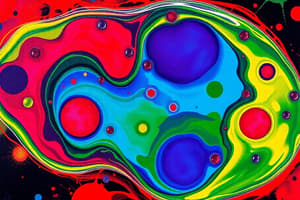Podcast
Questions and Answers
A researcher is studying the effects of dehydration on athletic performance. Which of the following scenarios would MOST likely result from a decrease in total body water?
A researcher is studying the effects of dehydration on athletic performance. Which of the following scenarios would MOST likely result from a decrease in total body water?
- Reduced mobility of ions, potentially impairing nerve and muscle function (correct)
- Enhanced digestion and absorption of nutrients due to increased solvent concentration
- Increased tactile sensitivity due to heightened nerve ending activity
- Improved regulation of body temperature through more efficient sweating
A patient presents with a condition causing excessive water retention. How would this MOST directly affect the electrolyte balance in their body fluids?
A patient presents with a condition causing excessive water retention. How would this MOST directly affect the electrolyte balance in their body fluids?
- Increase electrolyte concentration, leading to hypertonicity.
- Specifically increase calcium levels, aiding in bone mineralization.
- Decrease electrolyte concentration, potentially leading to hyponatremia. (correct)
- Stabilize electrolyte concentration by buffering the effects of dilution.
A patient's blood work reveals an abnormally low level of calcium ions ($Ca^{++}$). Which physiological process would be MOST directly affected by this imbalance?
A patient's blood work reveals an abnormally low level of calcium ions ($Ca^{++}$). Which physiological process would be MOST directly affected by this imbalance?
- Promoting mineralization of bone tissue (correct)
- Facilitating nerve impulse transmission
- Maintaining the osmolarity of body fluids
- Regulating body temperature through perspiration
If a 70kg individual's body composition is within normal limits, approximately how many kilograms would be comprised of water?
If a 70kg individual's body composition is within normal limits, approximately how many kilograms would be comprised of water?
During intense physical activity, the body relies on water for thermoregulation. Which mechanism BEST describes how water facilitates this process?
During intense physical activity, the body relies on water for thermoregulation. Which mechanism BEST describes how water facilitates this process?
Flashcards
Water Composition
Water Composition
Water makes up approximately 60% of body weight.
Other Body Composition
Other Body Composition
Proteins, fats, and electrolytes make up other 40% of body weight.
Importance of Body Water
Importance of Body Water
Water's roles include solvent, ionization, sensation, temperature control & flexibility.
Importance of Electrolytes
Importance of Electrolytes
Signup and view all the flashcards
Electrolytes and Cell Membrane Potential
Electrolytes and Cell Membrane Potential
Signup and view all the flashcards
Study Notes
Composition of The Human Body
- Water comprises 60% of body weight.
- Other components comprise 40% of body weight.
- This includes proteins at 18% of body weight.
- Additionally fats account for 15% of body weight.
- Electrolytes make up 7% of body weight.
Body Fluid Compartments
- A normal adult young male weighing 70kg has 60% of body weight as water.
- The water is distributed in two major compartments.
- The brain accounts for 83% of the compartments.
- The kidneys account for 83% of the compartments.
- The lungs account for 85% of the compartments.
- The eyes account for 95% of the compartments.
- The heart accounts for 75% of the compartments.
- The muscles account for 75% of the compartments.
- Blood accounts for 94% of the compartments.
- Intracellular Fluid (ICF) is 2/3 of Total Body Water (TBW).
- Extracellular Fluid (ECF) makes up 1/3 of TBW.
- Interstitial Fluid (ISF) represents 25% of TBW.
- Plasma is 8% of TBW.
- Plasma is 1/4 of ECF.
- Interstitial Fluid (IF) is 3/4 of ECF.
- Total body weight accounts for 60% of body weight.
Factors Affecting (TBW)
- Physiological factors like age, sex, and body fat affects TBW.
- Pathological factors such as vomiting, diarrhea, diseases with excessive loss of water e.g Diabetes Mellitus, and excessive Sweating, blood loss and burns affect TBW.
- Other climate, habits, and physical activity affect TBW.
- All of these factors can cause disturbances in fluid balance.
Body Fluid Content
- Low body fat, low bone mass accounts for 73% or more water.
- Higher body fat and smaller amount of skeletal muscles accounts for 40-50% water.
- 60% of body weight is water.
- only about 45% of body weight is water as one gets older.
Importance of Body Water
- Water constitutes no less than 40% of TBW of any living organism.
- It acts as a solvent for digestion, absorption, secretion, exertion, and mobility of ions.
- Water can dissociate into OH- and H+ due to its ionizing property.
- It is essential for all sensations except tactile ones.
- It regulates body temperature.
- It makes tissues pliable and flexible.
Body Electrolyte
- It Represents 7% of Total Body weight.
- It helps maintain osmolarity of body fluid.
- Each electrolyte has a specific function e.g., Ca++ in mineralization of bone.
- It helps determine cell membrane potential.
- It helps determine water content & distribution.
- It is affected by acid base balance.
Types of Solutions
- Classified into three types according to the size of the dissolved particle:
- True solution particle size is under < 1 mm and is stable and homogenous, it passes freely through a semi-permeable filter e.g., Nacl.
- Colloidal solution particle size is between 1-200 mm.
- It is stable and homogenous but cannot pass through the filter e.g., Egg.
- A suspension has a particle size of >200 mm.
- It is unstable & precipitates and cannot pass through a filter e.g., Blood.
Body Organization
- Cells: smallest independent unit of microscopic structure.
- Tissue: cells with similar structure and function.
- Organ: different types of tissues that carry out specific functions.
- System: the group of organs that carry out specific functions.
Studying That Suits You
Use AI to generate personalized quizzes and flashcards to suit your learning preferences.




